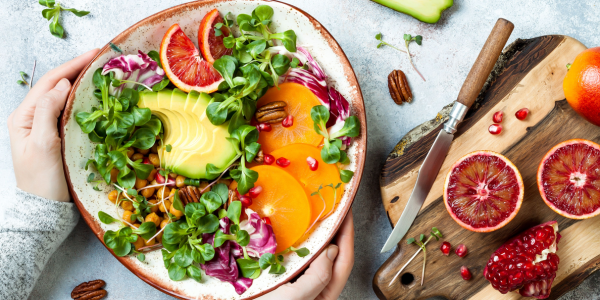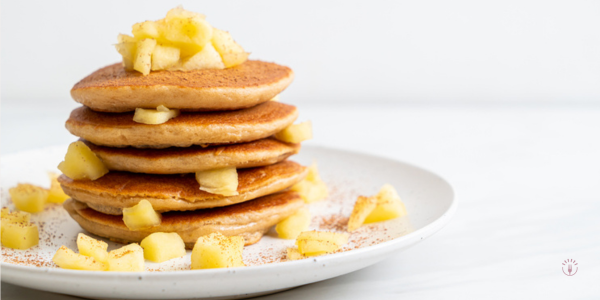
Is there anything better than a fudgy brownie freshly prepared?
Actually, yes!
A fudgy brownie that is freshly prepared and less than 100 calories and 8 grams of net carb per serving!
Our fudgy, flourless brownie recipe features healthy fats and is a gluten-free and dairy-free option. Find out how we prepare these delicious brownies and the ingredients that make them so special!
Flourless Fudgy Avocado Brownies
Yield: 16 brownies
Cook time: 20 minutes
Cal 95 | Protein 3g | Total Fat 6g | Sat Fat 3g
Sodium 70mg | Total Carb 10g | Fiber 2g | Sugar 7g
What You Will Need:
• 1 greased 8x8 baking dish
• 6 oz diced, ripe avocado
• 3 tablespoons coconut oil, melted
• 1 cup coconut sugar
• 3 extra large eggs
• 1.5 tsp pure vanilla extract
• 1/2 cup + 2 tablespoons unsweetened cocoa powder
• 1/4 teaspoon baking soda
• 1/4 teaspoon sea salt
• 1/4 cup almond flour
Instructions:
1. In a blender or food processor, combine avocado and melted coconut oil and blend until smooth.
2. Whisk eggs and vanilla in mixing bowl until eggs are well beaten, then add the avocado mixture to a bowl.
3. Add all remaining ingredients and mix well to ensure all ingredients are blended thoroughly.
4. Spritz a baking dish with non-stick spray or dip a paper towel into the jar of coconut oil and use it to grease the dish.
5. Place brownie mixture in a baking dish and cook in preheated 350°F oven for 20 minutes.
Pro tip: Ovens do vary in temperature, so check brownies with a toothpick at 18 minutes. If the toothpick comes out clean, your brownies are done!
Healthy Avocado Brownies: It's All In Our Ingredients
Vegetable oil, butter, chocolate chips, white sugar, and all-purpose flour: Core ingredients for a brownie batter. The combination of the ingredients offers a rich chocolate flavor with that desirable crackly top.
But we perfected a brownie that is rich in flavor while packing a big nutritional punch. Find out which ingredients make our dairy-free, gluten-free brownie recipe so special!
Avocado
Unlike most fruits recognized as carbohydrate sources, avocados are acknowledged for their fat content. Or, more specifically, the heart-healthy monounsaturated fat.
Avocados are also rich in dietary fiber which supports digestive and heart health. Fiber can also assist in weight management.
Aside from their healthy fats and dietary fiber, avocados are rich in vitamins and minerals such as:
• Copper
• Folate
• Magnesium
• Potassium
• Riboflavin
• Vitamin B6
• Vitamin C
• Vitamin E
• Vitamin K
Coconut Oil
Coconut oil is merely extracted oil from the white, mature coconut flesh or meat. While coconut oil does contain saturated fat like butter, the saturated fat found is mostly made up of medium-chain triglycerides (or MCTs).
Compared to long-chain triglycerides (LCTs) found in other liquid vegetable oils, dairy, and fatty meats, MCTs might be easier digested. Using coconut oil in a balanced diet may lead to a number of health benefits, including:
• Increase HDL (or "good") cholesterol
• Lower blood pressure by reducing vasoconstriction, or the tightening of blood vessels.
• Protect from dementia and Alzheimer's disease
• Boost the immune system
• Inhibit the dangerous growth of Clostridium difficile, a type of harmful bacteria
Almond Flour
Almond flour is a great flour alternative for baking gluten-free goods. It is also a low-carb option, which is hard to come across in delicious dessert recipes.
While almond flour is free of gluten and low in carb, it is packed with nutrients such as:
• Dietary fiber
• Protein
• Monounsaturated fat
• Calcium
• Iron
• Magnesium
• Manganese
• Riboflavin
• Vitamin E
Cocoa Powder
Unlike popular belief, chocolate can be healthy! It is when sugar and other oils are added that chocolate mixtures bare their "unhealthy" reputation.
Unsweetened cocoa powder is actually quite nutrient-dense while being low in calories. Beneficial nutrients include:
• Dietary fiber
• Copper
• Iron
• Magnesium
• Manganese
• Phosphorus
• Potassium
• Zinc
Perhaps the most notable nutrients supplied from cocoa powder are polyphenols, powerful antioxidants in a wide variety of plant-based foods. Polyphenols may reduce the risk of heart disease, certain cancers, and brain deterioration. They may also improve cell survival, prevent tumor growth, and defend against UV radiation.





